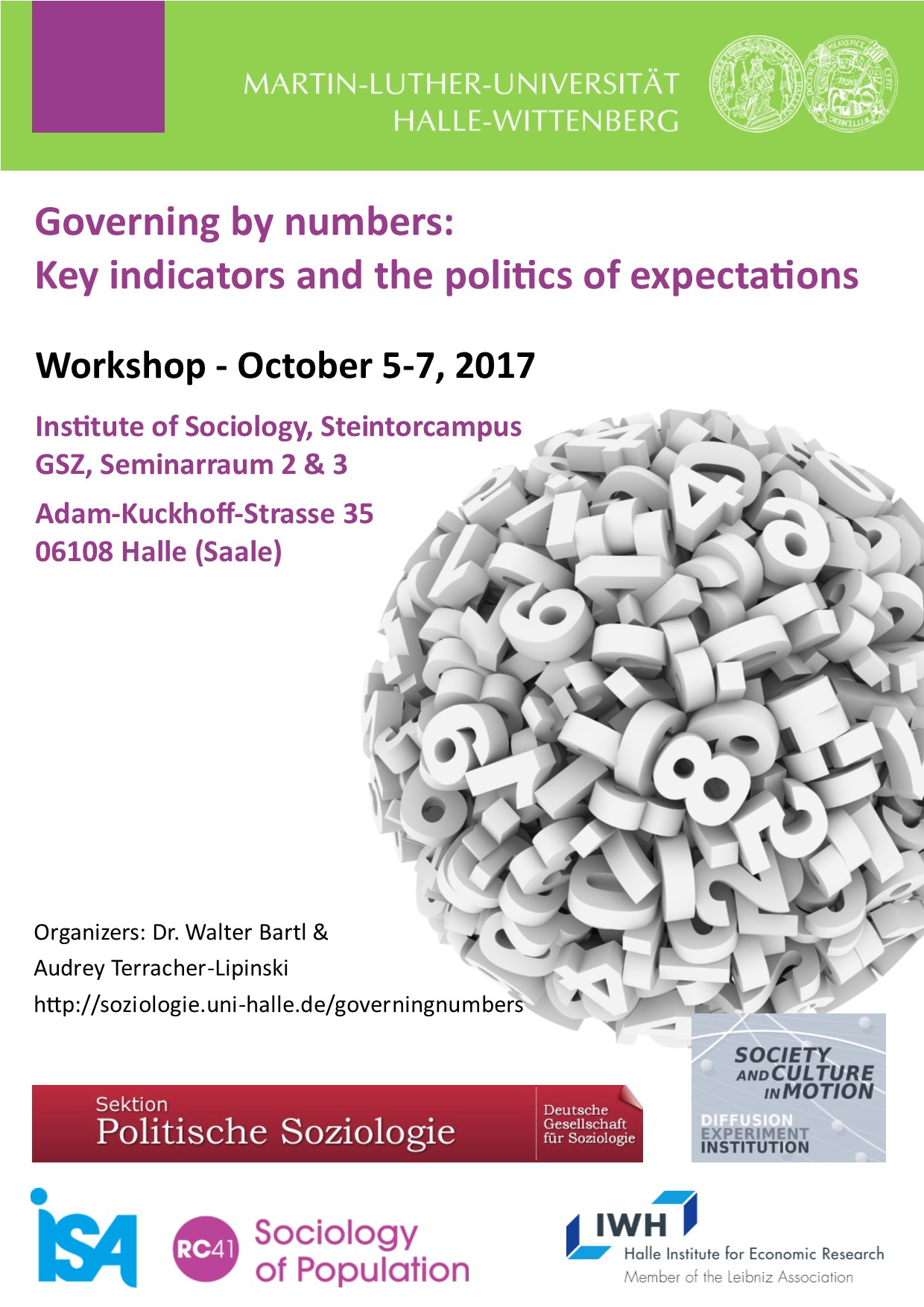
Login für Redakteure
Governing by numbers: Key indicators and the politics of expectations
News
Reviews
Thank you to Lisa Knoll for a first review of the conference: http://conventions.hypotheses.org/1053
Thursday, October 19, 18h:
Emmanuel Didier (Paris, CNRS, EHESS):
„Different numbers, different government“
For further information see the enclosed PDF.
Gastvortrag_didier.pdf
(206,9 KB) vom 12.10.2017
Governing by numbers: Key indicators and the politics of expectations
Workshop, October 5 – 7, 2017, Martin-Luther-University Halle-Wittenberg
Organizers: Walter Bartl, Audrey Terracher-Lipinski
Advisory committee: Petra Dobner, Oliver Holtemöller, Christian Papilloud, Richard Rottenburg, Reinhold Sackmann, Konstanze Senge
Politics in the 20th century created a whole array of indicators, such as gross domestic product (GDP) or unemployment indicators, that became crucial for the structuration of entire policy fields. Politics in the 21st century, inspired by the new public management discourse, complemented this trend by developing not only more indicators but also by inventing new forms of regulation and new ways of modelling political expectations about the future. In the sociology of quantification, the relevance of numbers in democratic politics and democratic representation was among the earliest issues addressed. A basic assumption in this line of reasoning is that there is an inherently political dimension to what seems to be methodological or technocratic issues in the quantification process. While research has become more diversified, there is also growing need for systematizing theoretical approaches and empirical findings as well as pursuing a strategic approach in defining desiderata for further research so as to build a more coherent stock of knowledge about the politics of quantification.
The planned workshop seeks to advance this endeavor by focusing especially on institutionalization processes of key indicators and particularly on the relevance of key indicators to a ‘politics of expectations’.
Governing by indicators: In a globalizing world of ever more complex social relations, there is a rising demand for accessible and comparable knowledge. Since numbers are said to possess many features that cater to this demand, quantification has been observed as a pervasive feature of contemporary society. Indicators are a special form of quantification in that they emphasize the intentional use of numbers and scripted (political) action. Indicators can be qualified, first, as numbers that use a limited set of measurable parameters to make phenomena visible that cannot be observed directly. Hence, otherwise latent phenomena become manifest by operationalizing them using certain indicators. For example, the American census created racial categories that consequently came to represent heterogeneous populations as homogeneous groups of society. Second, since indicators simplify complex phenomena, their interpretation depends on concepts that ensure their communicability. Concepts aid interpretation by relating the phenomena of interest to the chosen measure. However, these concepts (implicitly) contain causal attributions and, hence, suggest scripts for (political) action.
Key indicators and politics: The power of indicators to structure entire policy fields is very much debated. On the one hand, there is evidence that particular key indicators are so widely used in society that they have become crucial to the regulation of social life ― such as GDP with respect to economic policy. Among the evidence supporting this view is that the effects of some key indicators have a visible impact on policy fields ― a case in point are performance indicators and their impact on education policy. Other indicators operate largely hidden from public scrutiny. On the other hand, very often the power of indicators is also questioned ― as in the case of environmental indicators in politics. However, the processes by which indicators become institutionalized as key elements of collective efforts to achieve larger social goals are still poorly understood. The same can be said about conflicts over alternative indicators. With regard to the potential power of indicators, the contributions will address institutionalization processes of key indicators and conflicts that arise from divergent practices of using indicators in politics. Can indicators mediate conflicts between different actors?
The politics of expectations: The future is essentially uncertain. Yet political actors have to build expectations about the future in order to make plans and collectively binding decisions. Expectations are fictional in the sense that those who rely on them treat them as if they were certain to become reality. This creates an incentive for actors to try to influence the expectations of others by creating credible accounts of future states of the world. How are expectations about the future symbolized and narrated in politics? How do indicators operate as instruments of imagination? Do indicators measure past developments, implicitly assuming that these developments will continue in the future, or do they project future developments, explicitly aiming to account for the contingency of the future? Recently, there seems to be an increasing relevance of prospective indicators such as in inflation targeting when central banks communicate expected inflation rates or when policy targets are formulated as quantitative indicators such as in the European Union’s Open Method of Coordination or in the global governance of development.
The workshop is hosted by the Political Sociology Section of the German Sociological Association (DGS), Research Committe on the Sociology of Population (RC41) of the International Sociological Association (ISA), Research Cluster Society and Culture in Motion of the Martin-Luther-University Halle-Wittenberg, and Halle Institute for Economic Research (IWH) – Member of the Leibniz Association.
Confirmed speakers include Laurent Thévenot, Kenneth Prewitt, Christina Boswell, Rainer Díaz-Bone, Philipp Lepenies and others.
If you are interested in participating in the workshop, please register with the organizers (walter.bartl@soziologie.uni-halle.de, audrey.terracher-lipinski@soziologie.uni-halle.de) by October 1, 2017. Participation in the workshop is free of charge, there will, however, be a charge of 10€ for food and beverages.
